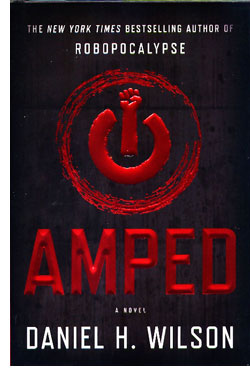 |
 |
 Daniel H. Wilson
Daniel H. Wilson
Amped
Doubleday / Random House
US Hardcover First Edition
ISBN 978-0-385-53515-1
Publication Date: 06-05-2012
278 Pages; $25.00
Date Reviewed: 06-22-2012
Reviewed by: Rick Kleffel © 2012
Index:
Science Fiction
General Fiction
Where will we draw the line between human and whatever it is that comes next? In what ways will our successors distinguish themselves from us, or we from them? Daniel H. Wilson's 'Amped' uses a classic science fiction literary technique to explore the emotional, legal, and societal impact of our inclination to define ourselves as human, and by doing so, exclude those who differ from ourselves. Wilson manages to elicit a lot of serious thought in the short space of an action-packed, engaging novel. 'Amped' is both entertaining and harrowing, a reminder of how often the future ends up repeating the past. Humans are ever so clever at learning new ways to make the same mistakes.
Before the novel begins, Wilson gives us his science fiction mcguffin, the "General Biologics Neural Autofocus MK-4," a brain implant that gives the recipient the ability to achieve more focused thought. It can help someone with ADD or PTSD live a normal life, or perhaps an even better than normal life. And it can confer upon someone who is normal a tremendous advantage over others. That's just the first of many problems, none of them with easy solutions. Wilson follows the manual for the MK-4 with the summary of a Supreme Court decision that declares those with this sort of hardware to not be a protected class. They can be legally discriminated against. And that's just page 5.
With this setup, we meet Owen Sharp, a schoolteacher whose father actually invented the MK-4, and installed an early model in Owen to cure him of epilepsy. It's his student who triggered the Supreme Court case, and helped to inspire the creation of a Pure Human Citizen's Council. The Supes' decision sends humans and "amps" into the streets, and Owen's father sends Jim to a refuge where amps try to keep themselves to themselves. It won't last long.
Wilson tells Owen's story in the present tense, and it's a tense tale, as the horror of oppression and institutionalized prejudice breaks out and tears apart families, friends and the nation. Amps and humans are headed for a violent clash, and Owen actually is someone who can make a difference. Maas violence seems inevitable, and readers will not be able to turn the pages fast enough to find out what is going to happen and why.
If it were merely an action-thriller, 'Amped' might be easily be competent and forgettable. But Wilson manages the difficult task of giving us a series of great characters and families who find themselves in the middle of a new struggle for civil rights. The character moments ring with sincerity, making the novel much powerful than you might expect. The perils they face are all-too real and relevant. Families pay a large part in what unfolds, as do the lower and middle classes. You do get a task force of military amps — they're veterans who have been shunted aside by the government that created them — but they're written more as homeless vets than military supermen. The focus in 'Amped' is on everyday Americans trying to come to grips with inevitable societal change.
Wilson's strong character work anchors the novel, but his ability to deuce the many implications of his single science-fictional invention is a constant source of delight and terror. Extremists on both sides of the divide create problems for everyone in the middle, as the legal and emotional ramifications of the technology unfold before our eyes. 'Amped' is a strong, smart, involving novel about the human addiction to human invention. As a very human invention, this novel itself is addicting. Be careful about when you pick it up, because it's hard to put down. It's fun even when it is very unsettling.
|
 |
|
|
 |
| |
Review Archive
All Reviews alphabetized by author.
General Fiction
Non-Genre, general fiction and literature.
Horror
Supernatural fiction, supernatural horror and non-supernatural horror.
Science Fiction
Science fiction, science fantasy, speculative fiction, alternate history.
Fantasy
Fantasy, surrealism and magic realism.
Mystery
Crime, thrillers, mystery, suspense.
Non-Fiction
Non-Fiction, True Crime, Forteana, Reference.
Poetry
|
|
 |
|




